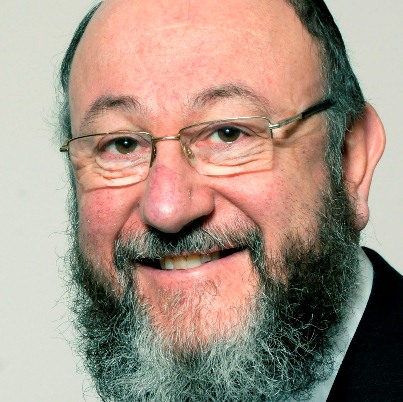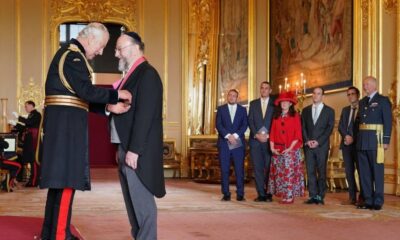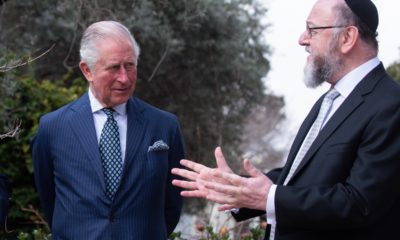
Jewish News

UK Chief Rabbi’s tribute to Madiba
UK CHIEF RABBI EPHRAIM MIRVIS
Remembering Mandela
The passing of Nelson Mandela has drawn my thoughts back to Cape Town, the city of my upbringing, a city where wealth glistened beside poverty and where liberty was manacled by the chains of separation and oppression.
Whilst my father, a Capetonian to this day, worked as a Rabbi in the local Jewish community, my late mother was the Principal of the Athlone Teachers Training College, a key educational facility for the country’s black community.
As a Rabbi’s wife and a mentor to the future black educators of South Africa, my mother’s roles fused naturally: Jewish tradition has always combined spiritual aspiration with social action, compassion and determination to support the oppressed. In my youth, it was simply impossible for me to ignore the city’s dual existence.
Indeed, the essence of our religion compels of its followers a proactive engagement with the world. Tikkun olam is a pillar of Judaism: that which is broken in the world should be repaired and healed. It was in this spirit that a young black man, intent on pursuing a career in the law that had so badly failed him, came to Johannesburg in the early 1940s. And it was in that same spirit that he joined a Jewish firm, Witkin, Sidelsky and Eidelman.
The two senior partners in the firm, Lazar Sidelsky and my grandmother’s brother, Benny Eidelman, took on Nelson Mandela as an articled clerk and in doing so, I am sure, took an early step with Mandela in his slow march to liberty. Their progressive approach was characteristic of the mindset of many Jewish South Africans, who identified actively, through their own historic experience, with the suffering of their black compatriots.
Recalling those days, Mandela noted in his autobiography that his articles had been taken at a Jewish firm, “and in my experience” he wrote “I have found Jews to be more broad-minded than most whites on issues of race and politics, perhaps because they themselves have historically been victims of prejudice.”
In his address at the opening of the Jewish Museum in Cape Town in 2000, Mandela paid tribute to the Jewish community of South Africa. He said, “there was a time when no lawyer in this country was prepared to take our cases, when only Jewish lawyers would defend us.” He added, “today we live in peace and many people will have forgotten the role of the Jewish community … it’s a community which we respect and admire.”
The Sages of the Talmud asked “who is a hero?” Their answer was remarkably concise: “one who turns an enemy into a friend.” Radical, unwavering and inspirational – of all his legendary attributes, however, it was the disposition to forgive, asking his countrymen to walk beside him in the path of peace and reconciliation, which must surely be his enduring legacy.
 In his inaugural Presidential address in May 1994, he declared that “the time for the healing of the wounds has come. The moment to bridge the chasms that divide us has come. The time to build is upon us.” How rare it is for so few words to shape human history so compellingly and yet, perhaps more than any other statement he uttered, these lines ensured South Africa would not descend into hatred, violence and bloodshed.
In his inaugural Presidential address in May 1994, he declared that “the time for the healing of the wounds has come. The moment to bridge the chasms that divide us has come. The time to build is upon us.” How rare it is for so few words to shape human history so compellingly and yet, perhaps more than any other statement he uttered, these lines ensured South Africa would not descend into hatred, violence and bloodshed.
The Talmud tells the story of a man who was travelling through the desert in the midst of the summer heat, hungry, thirsty and tired. Nearing exhaustion, he came across an oasis in which there was a beautiful tree. He ate of its delicious fruit, drank water from the brook beside it and rested under the protective cover of its boughs. When he arose, refreshed and rejuvenated, he turned to the tree and asked, “in appreciation of your kindness, what blessing can I give to you? You are surely already blessed with everything that a tree might wish for!” And then a thought crossed his mind. Turning to the tree he said simply, “may it be the will of God that all your offshoots be just like you.”
The world has lost a remarkable leader. The fruits of Nelson Mandela’s labours continue to have lasting impact. Eulogised by many, his lessons internalised by millions, how can we truly honour a man like Mandela? The greatest tribute we can make will be to emulate him. Each of us can become a hero; each of us can pursue peace, unity and reconciliation; and each one of us can strive to transform even the most fearsome of enemies into the truest of friends.
- This article originally appeared in ‘The Jewish Chronicle’
Chief Rabbi Ephraim Mirvis
Chief Rabbi Ephraim Mirvis is the 11th Chief Rabbi of the United Hebrew Congregations of the Commonwealth. He is only the 11th Chief Rabbi to take office since the office was introduced in 1704. Chief Rabbi Mirvis was installed on 1 September 2013 in an historic ceremony attended by HRH The Prince of Wales, the first time that a member of the Royal Family has attended a service for the Installation of a Chief Rabbi. Chief Rabbi Mirvis succeeds Lord Sacks.
Background and Education
Born in 1956 into a rabbinical family in South Africa, Chief Rabbi Mirvis studied at Herzlia High School, Cape Town (1968 – 73), Yeshivat Kerem BeYavne (1973 – 76) and Yeshivat Har Etzion (1976 – 78). He received his rabbinic ordination from Machon Ariel, Jerusalem (1978 – 80) and gained a BA in Education and Classical Hebrew from the University of South Africa. He also received certification from the Yaacov Herzog Teachers College as a high school teacher in Israel.











Dr Helmut Heydt
July 21, 2023 at 9:57 am
Dear Ephraim
Mazal Tov. We go back a long time–your respected father, Lionel,
and I played bridge together; and you and I spent time together in that wonderful town–Benoni–not as the “Son of my Sorrow” but as the harbinger of good for our Jewish life. Alas, that fine congregation finally had to close its doors recently. In our time the United Hebrew Congregation of Benoni shrivelled from over 400 families to…well almost zero. And so a Benoni-bocher became Leader in our Commonwealth.
May the work of your hands be Blessed.
Helmut
May you and your family be b lessed.